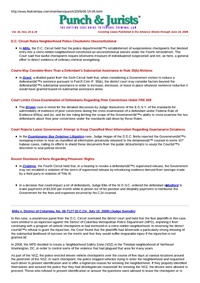Loaded on
June 1, 2009
published in Punch and Jurists
June 15, 2009
Here the Court held that the police department’s establishment of suspicionless checkpoints that blocked entry into a crime-ridden neighborhood constituted an unconstitutional seizure under the Fourth Amendment since there was no individualized suspicion.
In this case, a unanimous panel from the D.C. Circuit overruled the district court and …
Loaded on
June 1, 2009
published in Punch and Jurists
June 15, 2009
This 19-page ruling by Judge Hogan underscores some of the Government-created obstacles to the ending of the autocratic and arbitrary detention policies at Guantanamo Bay and to the implementation , in any fair and meaningful manner, of the Supreme Court’s mandates in Boumediene v. Bush, 553 U.S. ___, 129 …
Loaded on
June 1, 2009
published in Punch and Jurists
June 15, 2009
This is an interesting decision in which the Fourth Circuit vacated a defendant’s conviction and two-year sentence for violating the terms of his supervised release because the district court had committed reversible error by admitting into evidence recordings made by the defendant’s ex-girlfriend in violation of Title III.
While …
Loaded on
June 1, 2009
published in Punch and Jurists
June 15, 2009
In a decision that provides a lot of insights into the purposes of, and the burdens of proof under, Fed.R.Evid. 609(a)( and (b), Judge Kiyo Matusmoto presented a studious analysis of her reasons for refusing to allow the Government to cross-examine one of the defendants in this case about …
Loaded on
June 1, 2009
published in Punch and Jurists
June 15, 2009
Here a divided panel held that, when considering a Government motion to reduce a defendant’s sentence pursuant to Fed.R.Crim.P. 35(b), the district court may consider factors beyond just the defendant’s substantial assistance.
Rule 35(b)(1) of the Fed.R.Crim.P. provides that a district court may reduce a defendant’s sentence if …
Loaded on
June 1, 2009
published in Punch and Jurists
June 15, 2009
In a case of potential far-reaching consequence, Judge Ellis ordered the defendant to make monthly payments of $3,500 throughout his entire 180 months of incarceration (a grand total of $630,000) to reimburse the Government for his CJA counsel fees, even though, at sentencing, Judge Ellis found that the defendant …
Loaded on
June 1, 2009
published in Punch and Jurists
June 15, 2009
In this case, Scott Samford, a Texas state inmate who is serving a 20 year sentence, appealed from the dismissal of his civil rights lawsuit under 42 U.S.C. 1983 against Texas prison officials on the grounds that his complaint was both frivolous and failed to state a claim under …
Loaded on
June 1, 2009
published in Punch and Jurists
June 15, 2009
Conviction for conspiring to commit three money laundering offenses is reversed where: 1) a reasonable jury could not find beyond a reasonable doubt that the purpose of defendant's transportation of narcotics proceeds was to conceal the nature, location, or source of the narcotics proceeds; and 2) the government failed …
